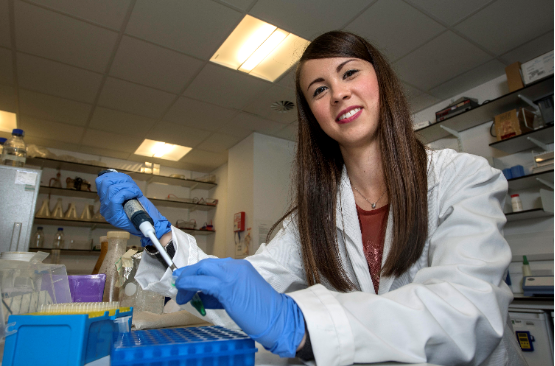On-Campus Postgraduate Study - Frequently Asked Questions
Thinking about studying an MSc or PhD? In this blog post, we answer some of the internet's most frequently asked questions about on-campus Masters and PhD programmes.

PhD
1. What makes a great PhD applicant?
This is a very good question and one that comes up time and again. The PhD application process can be daunting and if you're applying to a competitive field then you'll probably come up against a few rejections before managing to land an interview. Even then, success isn't always guaranteed...so what qualities does a PhD applicant need in order to earn that coveted research post?
First of all, your application letter should radiate enthusiasm about your area of study. Supervisors want to see that you'll be committed enough to finish the PhD after 3-4 years of intensive research, so if they don't see any kind of passion about the science in your application letter, then you probably won't be shortlisted for interview.
A great PhD applicant should also be proactive enough to contact someone at the university before beginning their application. Whether you e-mail, make a phone call or even knock on their office door, introducing yourself to a potential supervisor before applying will make you stand out from the crowd.
Finally, when you get that interview...don't be afraid to sell yourself! Most people struggle at telling others what they're really good at. But in a PhD interview you should be able to confidently highlight your key skills and achievements.
Don't just tell someone you did something. You have to say you did it well!
For more tips on how to get a PhD, visit our blog post below which contains plenty more helpful tips and advice from our staff and PhD students here at the University of Edinburgh's College of Medicine and Veterinary Medicine.
How To Get A PhD - Ten Tips for Success
2. What would a PhD graduate advise a new PhD student?
If you're just getting started with your research and want to hear from someone who has already been there, done it and submitted the thesis, then we have plenty of student bloggers who have shared their wisdom with our readers over the years.
There are definitely some recurring themes that come up time and again, particularly around time management. Plan carefully for deadlines and don't force yourself to work endless hours just for the sake of it - you won't produce anything worthwhile. On the other hand, if you find yourself with a little less work to do than usual, why not use this time to start your literature review or maybe think about a conference paper?
A break is well-deserved, especially after particularly hectic weeks, but trust me, future you will be eternally grateful for any little bit of work that you do now that will help you out in the future. Regular meetings with your supervisor will also help keep you on schedule.
Many of our graduates also appreciate the importance of having a good support system - keeping in close contact with friends and family is key, as well as attending events that will help you to meet fellow PhD students going through the same things that you are.
And finally - exercise! Whether you enjoy walking, running or mountain climbing, make sure that you give yourself a break every once in a while and get those endorphins going.
For more excellent advice, Katherine's blog post below contains further tips for new PhD students who are just starting out on their journey.
Katherine, PhD Biomedical Sciences - "What I have learned so far V3.0"
3. What's the quality of life like for a PhD candidate?

Many people want to know how many hours a week PhD students really work. We often assume that researchers must be studying every day for 10 hours straight, without taking a break, and hiding away in the lab or library without ever seeing the sun! And to be honest, this is a perfectly reasonable assumption to make, especially when society usually talks about PhDs as though students have to 'survive' them.
In reality, most PhD students will balance their hours in the lab or office with a nice variety of extra-curricular activities. These could be related to their research in some way e.g. socials with fellow lab members, conferences, poster days and other academic events. Or they'll be using their free time to go travelling, visiting family/friends, pursuing hobbies, and generally just getting some much-needed time away from research.
Although we do have to accept that the average PhD student will probably experience more stress during their studies than an undergraduate student, many PhDs today are aware of cultivating good mental health. If you're still not convinced, the blog posts below have been written by some of our PhD students who believe that work-life balance is simply about managing your time - you can enjoy your weekends and still produce a high-quality thesis from a top university.
Chiara, PhD Neuroscience - "Venturing outside the lab..."
Amy, PhD Population Health Sciences - "Incorporating travel and mindfulness into research..."
4. What qualities characterise a great PhD student?
Hard working, enthusiastic and curious are probably some of the best qualities a PhD student can have. Keep asking questions and accept that you're always still learning, even when you hand in that thesis! As we've stated above, good time management is another quality that most postgrads will need to try and develop if you want to submit on time and without driving yourself up the wall!
5. How do you come up with an original idea as a PhD student?
Read all of the most important papers, books and journals around the subject area you're interested in - then try and identify what hasn't been said. Think critically about the literature that's already out there and assess how useful it is in approaching sub-topics related to your area of interest. What would you do differently?
For PhD students in life sciences and medicine, this issue is sometimes less of a problem, especially when you're applying to a post within a specific lab. But it's still a good idea to have an excellent grasp of how you can start to bring your own ideas (backed up by rigorous research) into the field and challenge pre-existing thought.
Masters
1. What is life like as a Masters student?
Life as an on-campus Masters student partly depends on whether you decide to go for a taught Masters

or a research Masters. Basically you'll either learn through a mixture of taught classes followed up by a research project at the end, or you'll find yourself doing more intensive research part of the way through your degree. For more information on the difference between a taught Masters (MSc) and a Masters by Research (MScR), visit our blog post below:
The MSc by Research - Not just a 'stepping stone' to a PhD
When it comes to your free time, life as a postgraduate student provides you with plenty of opportunities to meet new people or take up a hobby. At the College of Medicine and Veterinary Medicine, we have thriving postgraduate societies, regular public lectures, socials, fundraising events...and that's not including the many activities that the University as a whole provides.
If you want to get a real insight into life as a Masters student here in Edinburgh, our student blogs are a great place to start. Click on some of the links below to read more about what our students have to say:
Kayla, Master of Public Health - The Start of 2018: A Collective Overview
2. How difficult is a Masters degree?
A Masters degree is obviously a big step up from undergraduate study, but how 'difficult' it really is can be hard to say. As long as you work hard when you need to and stick to your deadlines, you should find the experience an extremely rewarding one!
However, if you do happen to come up against some problems during your MSc, then you'll have plenty of support to help you along the way. Your supervisors and tutors will be very understanding, and remember you can always chat to one of them if you're having a hard time. There are also various student support services which you will be introduced to when you first start your programme, just in case you find yourself struggling.
The Introduction to Systematic Reviews is actually one of my most challenging courses because I don't have a strong background in research. Thankfully, we have helpful professors teaching this course who regularly offer extra help workshops to teach us how to properly use search platforms such as PubMed/Medline, Osiris, WHO IRIS and many other helpful databases. This course will be beneficial going forward with gaining background information for my dissertation.
3. Is a Masters degree worth it?
As well as developing key skills, a Masters degree is an excellent way to extend your professional network. You will likely find that your MSc has provided you with lifelong contacts in science and medicine. This is mainly down to the fact that conferences, poster days and society events all provide plenty of opportunities for Masters students to make important connections with people working in their field. These kinds of networks could prove invaluable, even if you decide to make the switch to a more industry-based role, rather than staying in academia.
Furthermore, many studies suggest that earning a Masters qualification will increase your earning potential. Although it’s not a guarantee, having a Masters degree on your CV makes it more likely that you’ll earn a higher salary. Statistics show that full-time employed, working-age postgraduates in the UK had an average salary of £39,000 in 2017, compared with £33,000 for working-age undergraduates.*
*Graduate labour market statistics, 2017
4. How many years does a Masters degree take?
An on-campus Masters degree typically takes a year to complete, with the exception of some dentistry courses which can take slightly longer (around two years). This gives you the opportunity to live in a new place for a year and experience a different culture, all while earning a degree from a respected university.
For more information on on-campus Masters options at the College of Medicine and Veterinary Medicine, visit the website below:
5. How old are Masters students?
That really all depends! This question comes up a lot, and it seems to stem from worries that mature students might have about joining higher education in later life. Everyone is welcome to apply for an on-campus Masters as long as they meet the correct entry requirements.
However, if you're slightly older than the average Masters student and want to earn a postgraduate degree without the need for 'campus life' too, you might want to consider studying for an online Masters degree. We offer a wide range of online Masters programmes which are completely flexible, allowing you to continue working full-time or looking after family while earning an MSc from a respected university.
For more information on our full range of online programmes, visit the link below:
Related Links
Top 10 Study Tips for PhD and Masters


